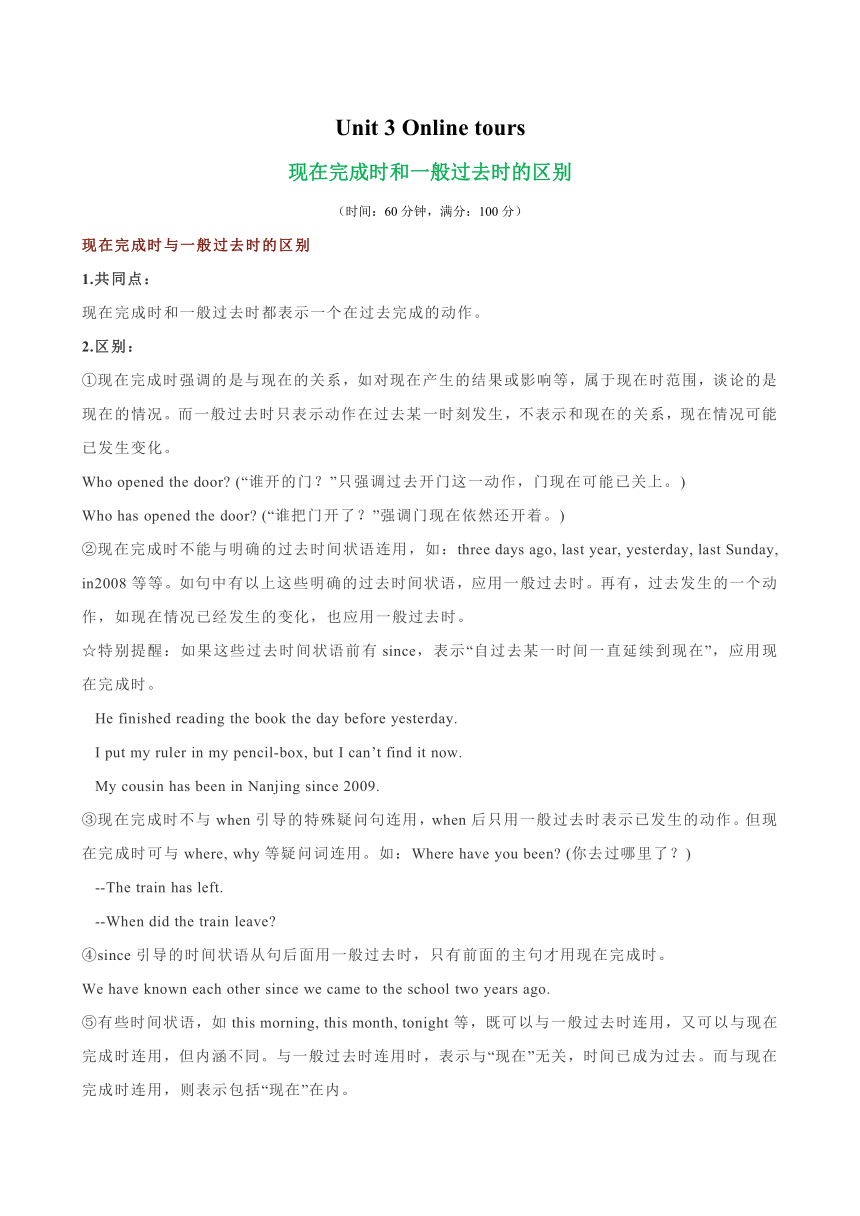
Unit 3 Online tours 现在完成时和一般过去时的区别 (时间:60分钟,满分:100分) 现在完成时与一般过去时的区别 1.共同点: 现在完成时和一般过去时都表示一个在过去完成的动作。 2.区别: ①现在完成时强调的是与现在的关系,如对现在产生的结果或影响等,属于现在时范围,谈论的是现在的情况。而一般过去时只表示动作在过去某一时刻发生,不表示和现在的关系,现在情况可能已发生变化。 Who opened the door (“谁开的门?”只强调过去开门这一动作,门现在可能已关上。) Who has opened the door (“谁把门开了?”强调门现在依然还开着。) ②现在完成时不能与明确的过去时间状语连用,如:three days ago, last year, yesterday, last Sunday, in2008等等。如句中有以上这些明确的过去时间状语,应用一般过去时。再有,过去发生的一个动作,如现在情况已经发生的变化,也应用一般过去时。 特别提醒:如果这些过去时间状语前有since,表示“自过去某一时间一直延续到现在”,应用现在完成时。 He finished reading the book the day before yesterday. I put my ruler in my pencil-box, but I can’t find it now. My cousin has been in Nanjing since 2009. ③现在完成时不与when引导的特殊疑问句连用,when后只用一般过去时表示已发生的动作。但现在完成时可与where, why等疑问词连用。如:Where have you been (你去过哪里了?) --The train has left. --When did the train leave ④since引导的时间状语从句后面用一般过去时,只有前面的主句才用现在完成时。 We have known each other since we came to the school two years ago. ⑤有些时间状语,如this morning, this month, tonight等,既可以与一般过去时连用,又可以与现在完成时连用,但内涵不同。与一般过去时连用时,表示与“现在”无关,时间已成为过去。而与现在完成时连用,则表示包括“现在”在内。 I saw him this morning. (时间已不在上午了。) I have seen him this morning. (说话时间还是上午。) He lived in New York for eight years. (他现在已经不在纽约住了。) He has lived in New York for eight years. (他现在还在纽约居住。) 2. 常连用的时间状语不同 (1)常与一般过去时连用的时间状语 yesterday (morning, afternoon, evening):昨天(早上,下午,晚上) the day before yesterday前天 last+时间名词:上一个… 如:last night (week,Sunday,weekend,month,winter,year,century 世纪) 时间段+ ago:在…之前 如:three days ago:三天前 a moment ago刚才 this morning/afternoon今天早上/ 今天下午 when+ 过去时的句子:当…的时候 when I got up just now 刚刚 before 以前 或 before+时间点 at the age of 10 (过去年龄段):在10岁的时候 in the old days 在古时候 at that time/ moment在那时候 (2)常与现在完成时连用的时间状语 for + 时间段: 持续了一段时间 I have lived here for 8 years. He has done his homework for two hours. since + 过去时间点/ 过去时句子:自从…开始 since + 时间段 + ago:自从…开始 I have lived here since 2008 He has done his homework since 8:00 p.m. / He has done his homework since two hours ago. just:刚刚 I have just called you ever: 曾今、 从来 Have you even been to Beijing Has he ever made such a mistake never: 从未 从来没有 I have never been there before. already已经 I have already finished my homework. yet: 还(否定句)已经(疑问句) I haven’t finished my homework yet. Have you finshed your homework yet? before: 以前 Have you ea ... ...
~~ 您好,已阅读到文档的结尾了 ~~

